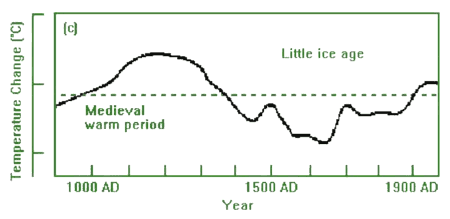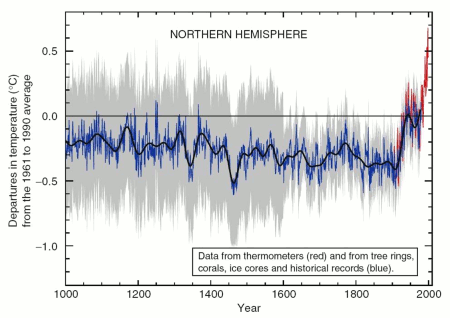One disputed issue remains fundamental to concerns over global warming. It is whether 20th century warming is so exceptional that it can only be explained by changes to the atmosphere caused by burning fossil fuels. It, and with it the theory of human causation, is incapable of absolute proof and is at best a matter of judgment, or if the arguments are not fully considered, simply a matter of belief.
How the IPCC has dealt with this issue exposes poor process, bias and concealment that make the IPCC assessments unreliable as the monopoly authority on the science.
The IPCC had been set up in 1988 with the Governing Principle stating its role as “to assess on a comprehensive, objective, open and transparent basis the scientific, technical and socio-economic information relevant to understanding the scientific basis of risk of human-induced climate change”. It was to review published papers, record differing scientific views and ensure that reviewers of its draft reports had access to any materials referenced in the papers it cited.
Advertisement
In its First Assessment Report (FAR) in 1991 the IPCC reported the alarming forecasts from the climate models that had led to its formation but said of 20th century warming, “A global warming of larger size has almost certainly occurred at least once since the end of the last glaciation without any appreciable increase in greenhouse gases. Because we do not understand the reasons for these past warming events, it is not yet possible to attribute a specific proportion of the recent, smaller warming to an increase of greenhouse gases.”
At the time the consensus view of scientists was that it had been much warmer in earlier interglacial periods as well as in the Medieval, Roman and Minoan times. The FAR showed this in three panels the third of which is reproduced below, showing the Medieval Warm period still warmer than now and the more recent Little Ice Age from which some argue we may still be recovering. If the 1991 view of historic temperature were true it places limits on the possible role of greenhouse gases.

Average global temperatures from 1000 AD as shown in the First IPCC Assessment
Despite the uncertainty of the FAR the United Nations Framework Convention on Climate Change was signed in 1992, which implicitly accepted human causation. This seemed to mark a turning point and no subsequent IPCC report details differing scientific views as to human causality.
The Second Assessment Report of 1995 noted growing confidence in climate models and hinted at research that might prove late 20th century warming to be unique in 10,000 years, reversing the earlier consensus view. Some, however, had managed to prevail upon the authors to include in the final draft differing expert views on the reliability of models but these were unceremoniously deleted from the published text. Few dissenting scientists now take part in the IPCC process.
Looked at from the point of view of “marketing” global warming to a sceptical audience the FAR view of historic temperatures was a major hurdle. In 1996 one IPCC lead author is reported to have said, “We must get rid of the Medieval Warm Period”. His wish was soon granted. In 1988 the first of the two “hockey stick” papers was published. Its lead author was a 32-year-old Michael Mann who received his PhD the same year.
Advertisement
In 1999 the study was extended to suggest that from 1000 AD average global temperatures fell gradually at about 0.02C per century until the middle of the 19th century. Dr Mann became a lead author of WGI Chapter 2 that featured his studies in the IPCC Third Assessment Report (TAR) of 2001.

Average N.H. temperatures from 1000 AD as shown in the Third IPCC Assessment
On first seeing the “hockey stick”, shown above, veteran climate researcher Gerald North said "The planet had been cooling slowly until 120 years ago, when, bam!, it jumps up," ... "We've been breaking our backs on [greenhouse] detection, but I found the 1000-year records more convincing than any of our detection studies."
Discuss in our Forums
See what other readers are saying about this article!
Click here to read & post comments.
79 posts so far.